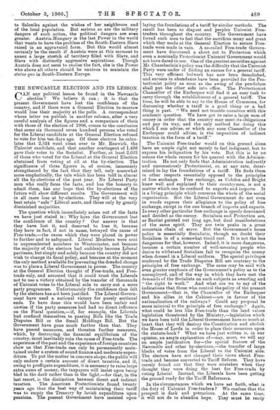TOPICS OF THE DAY.
THE SITUATION IN THE NEAR EAST.
AS we write it seems probable that a pacific solution will be found of the dispute over the Bulgarian Railway. That being the case, the less said for the present on this specific point the better. We must, how- ever, say once again that the best friends of Bulgaria in this country remain convinced that the Principality will be wise if she does not yield to the temptation to make Turkish difficulties the opportunity for gratifying her national aspirations. It is perhaps natural that she should desire a change of status, but considering that the change would only be nominal, and that in truth she suffers no political inconvenience, or at any rate no political weak- ness, from maintaining the status quo, it would be most unwise to take action which might lead to war. No doubt Bulgaria has a strong army, but after all she is a very small country and her financial position is necessarily weak. In these circumstances, war with Turkey has great risks, even though Bulgaria can calculate upon victory for her arms for the first few months. What Bulgaria has to remember is that even if she beat the Turks in the field, occupied the greater part of Macedonia, took her troops up to the gates of Constantinople, and in fact did all that from the military point of view she can hope to do in her wildest and most ambitious dreams, she would in all probability have achieved nothing substantial.
Accept the supposition of victory to the full, and yet it remains a fact that the more her arms prevailed and the further she carried her conquests, the greater would be the anxieties and jealousies created among the Powers, and the greater the likelihood that they would meet in conference and come to some agreement in which Bulgarian interests would be sacrificed. Russia, after an exhausting war, managed to reach the outskirts of Constantinople and to penetrate the Asiatic provinces of Turkey. Yet this did not prevent an agreement of the Powers at the Berlin: Con- ference which-in effect deprived her of the fruits of victory and distributed them among those who had taken little or.no part in the fray. Can we deny that a similar fate would almost certainly overtake a victorious Bulgaria ? The people who reaped the harvest after the Russo-Turkish War were not the Russians, but the Roumanians, the Bulgarians, the Servians, the Austrians, the Greeks, the British, and, perhaps we ought to add, the French, since the occupation of Tunis, over which the Sultan claimed suierainty, was an outcome of the Berlin Conference. Take another example of the results of war in South-Eastern Europe. Though the Turks beat the Greeks so completely, Turkey was not allowed by the Powers to take advantage of her conquests, and, indeed, it might be not unfairly said that the net result of the war was in the long run the loss of. Crete to the Turkish Empire. It is not difficult to imagine an arrangement made by a Conference held, say, at the Hague after a successful Bulgarian war—a war stopped by the combined naval and military action of the Great. Powers—under which the last people to profit would be. the Bulgarians. If the Bulgarians are wise, they will create a claim upon the consideration of the Great Powers by inaction rather than by action, and by refusing to take an opportunity rather than by seizing it. No doubt a Bul- garian might reply with some truth that the Great Powers are so much at sixes and sevens over 'their policy in the Balkans, and are occupying such different attitudes towards the idea of a regenerated Turkey, that it would be very bad business to count upon their benevolence based upon an act of Bulgarian self-denial. We admit the truth of the indictment, and we fear it is only too likely to be the cape that'Bulgaria. has lately. received suggestions in certain quarters incompatible with the notion that she will oblige all the Powers by keeping quiet just now. Never- theless, we are convinced that in the end Bulgaria would actually gain by the maintenance of peace, and by having on her side those who desire that no capital should be made out of the present condition of Turkey.. In the case of war Bulgaria would have no real friends, though there might be Powers willing to take advantage of the trouble created in order to push their own ambitions. If, on. the other hand, Bulgaria keeps the peace, she may rely at any rate • upon Russia, Britain, France, and Italy showing gratitude to her for not having involved Europe in the perils of a Balkan war.
While dealing with the situation in the Balkans it is impossible to refrain from expressing admiration of the wisdom, moderation, and good sense displayed in Turkey. Though the Young Turks, as is general with the engineers of revolutionary reform, are most anxious to show that they are good patriots, and do not wish to do anything which may lead to the disintegration of their country, it is clear that they take no exaggerated view of the nominal position of Bulgaria. They by no means desire to advance vague claims of Turkish suzerainty over those portions of the Empire which have been severed from the main stock during the past genera- tion. They realise that Bulgaria is csto all intents and purposes an independent country, and will remain so. Again, they feel that the existing Turkish Empire is quite a large enough field for their activities, and that they will have plenty to do in reorganising and developing the de facto dominions of the Sultan without troubling about those in which he is merely a de jure Sovereign. But though the leaders recognise these facts clearly enough, the Young Turks are in many ways in a difficult position, and not unnaturally dread the forces of reaction. Therefore they do not wish at the present moment to give any excuse for the allegation that they have sacrificed the rights of Turkey, even in theory. This being so, there should be no difficulty in some mediating Power or Powers giving assurances to Bulgaria that if she is reasonable and patient just now there will later on be a, readjustment of her relations with Turkey which will be satisfactory to both sides. Our duty, at any rate, is clear. Bulgaria owes a great deal to British sympathy, and we trust that she will enable us to remain her friends. At the same time, the Young Turks have behaved and are behaving so well, and the regeneration of Turkey on sound lines is of such vast importance to the peace of the world, that there can be no question as to which way British influence should be exerted. It must be exerted strongly to support the new regime. If the forces of. reaction were to overwhelm the Yonne, Turks, and Turkey were to fall into a state of anarchy, the whole world must suffer. It is, in fact, our duty, not only as a Power inti- mately concerned with preserving the peace of the world, but also as a Power responsible for the welfare of a vast Mohammedan population, to give our sympathies to those who sincerely desire to regenerate the greatest independent Islamic kingdom on sound lines. We ask nothing from Turkey for ourselves. All we want is a strong, peaceful, and well-organised Empire. Whether it will be possible to form such an Empire out of the welter of faiths, races, and ideals which exist in Asiatic Turkey—it is Asiatic Turkey which counts—remains to be seen. For ourselves, we cannot profess to be altogether optimistic ; but at any rate the experiment is well worth trying, and must .have our warmest good wishes and co-operation.
We have spoken of the dangers which may come from the reckless use by Bulgaria of her opportunity, or what she thinks her opportunity, to alter the status quo for her own benefit. The same may very well be said of Austria- Hungary. There seems, unfortunately, to be a vague and restless notion in the dominions of Francis Joseph that the Empire ought to strike while the iron is hot, and to take advantage of the Turkish Revolution. We are convinced that the Austrian statesmen could make no greater mistake, even from the purely selfish point of view, than to act on these lines. In the first place, it appears pretty clear that Austria-Hungary does not really know what she wants in South-Eastern Europe. She has, no doubt, a vague desire to go to Salonika, and to incorporate not only Bosnia but Herzegovina in her Empire, and also to obtain the lion's share of Macedonia and Albania. There is evidence, however, that the wiser minds in Austria- Hungary see that the gratification of these ambitious views, even if it should prove possible, might be exceedingly dangerous not only from a political but from a military point of view. By stretching her arm out to Salonika Austria-Hungary would be literally thrusting her hand into a hornets' nest, and exposing herself to attacks of a most dangerous kind on both sides, let alone the possibilities of internal revolt in her new acquisitions. The merest tiro in strategy who looks at the map will realise how dangerous would be the situation of Austria if she went to Salonika against the wishes of her neighbours and of the local population. But serious as are the military dangers of such action, the political dangers are even greater. Austria-Hungary is the last Power in the world that wants to have the problem of the South-Eastern Slays raised in an aggravated form. • But this would almost certainly be the result if Austria were at this moment to annex a large stretch of territory filled with Slays, and Slays with distinctly aggressive aspirations. Though Austria does not seem to realise the fact, she is the Power who above all others should be anxious to maintain the statics quo in South-Eastern Europe.

























































 Previous page
Previous page